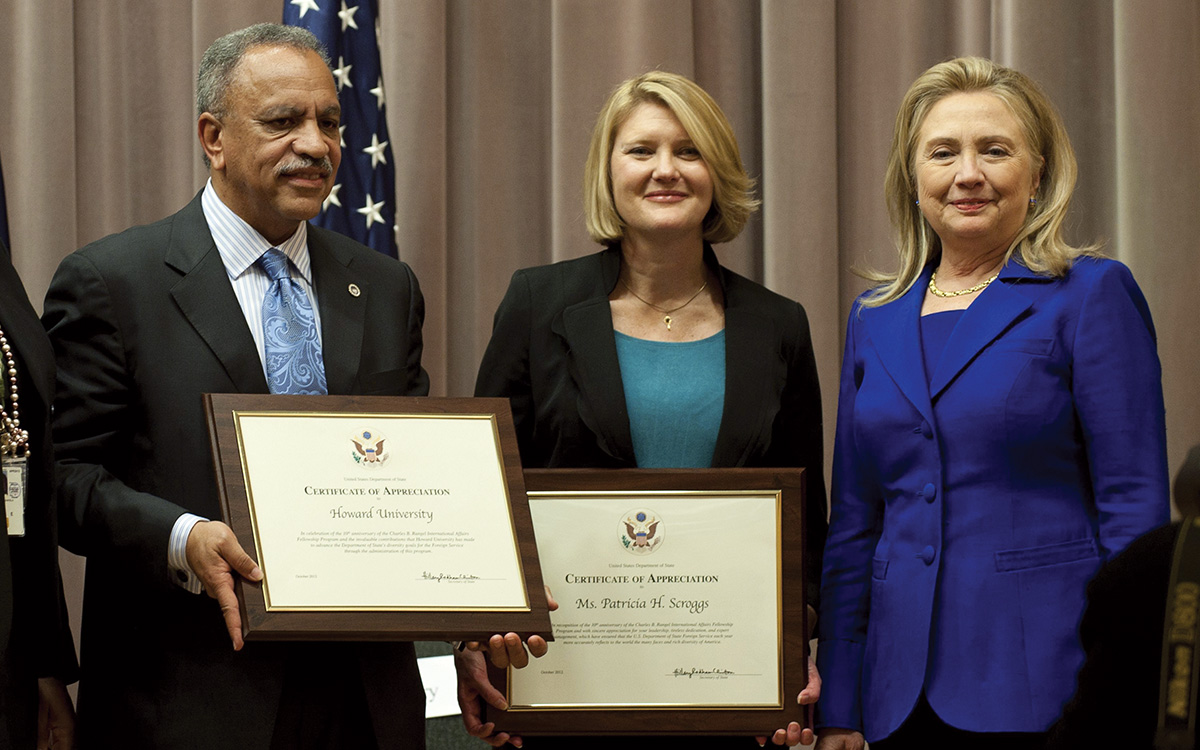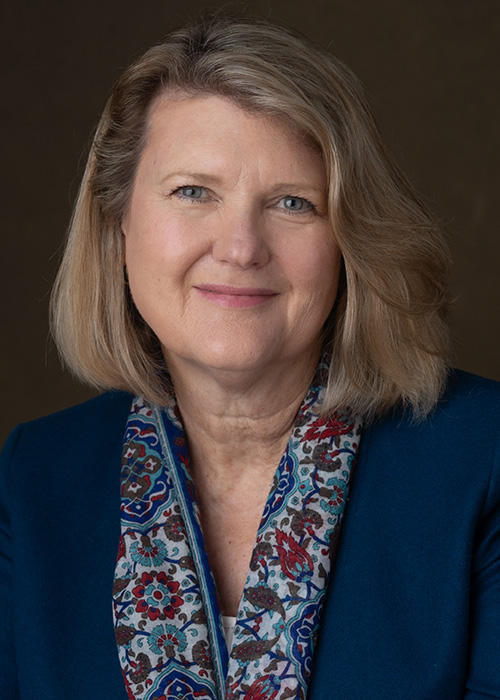2024 Foreign Service Champions Award

Secretary of State Hillary Rodham Clinton recognizes Patricia Scroggs (center) and then–Howard University President Sidney Ribeau at the Oct. 2, 2012, celebration of the Pickering Fellowship program's 20th and the Rangel Program's 10th anniversaries.
Foreign Service Champions Award
Patricia Hanigan Scroggs: Building a More Diverse Service from the Outside
AFSA is proud to honor Patricia Hanigan Scroggs as the 2024 recipient of the Foreign Service Champions Award. This prestigious award, established in 2021, recognizes individuals who have made significant contributions to diplomacy and the U.S. Foreign Service, demonstrating a deep commitment to the institution and positively shaping the future of U.S. foreign policy.
Patricia Scroggs embodies the spirit and the highest standards of this award. With almost 40 years of service, both inside and outside the State Department, she has left an indelible mark on the U.S. foreign affairs establishment by fostering inclusivity and innovation in the recruitment of Foreign Service officers.
Scroggs served as the director of diplomatic fellowships at Howard University until her retirement in January 2024, guiding fellowship programs that are transforming the workforce of the foreign affairs agencies. Following a 20-year Foreign Service career, Scroggs joined Howard University in 2006 to lead its efforts to administer the Charles B. Rangel International Affairs Program jointly with the U.S. Department of State. Over the next 18 years, she worked with State, USAID, and USDA to develop, administer, and expand the number and scope of high-impact diplomatic fellowship programs.

Patricia Hanigan Scroggs
Among her most notable achievements is successful leadership of the Department of State’s Charles B. Rangel International Affairs Program and the Thomas R. Pickering Foreign Affairs Fellowship; USAID’s Donald M. Payne International Development Fellowship; and USDA’s Foreign Agricultural Service International Agricultural Fellowship and Animal Plant Health Inspection Service Foreign Service Fellowship Program. Howard University administers these fellowships jointly with U.S. government agencies through cooperative agreements.
Behind her tireless work are two simple yet powerful passions: to make the Foreign Service more diverse, equitable, and open to new perspectives, and to attract top talent prepared to advance U.S. national interests.
Throughout her career, Scroggs has been relentless in her advocacy, building relationships across the diplomatic establishment and working closely with AFSA, developing a nationwide network of individuals who help identify diverse talent for the fellowships, establishing innovative professional development and mentoring programs, and facing down challenges such as the COVID-19 pandemic and budget constraints.
She has fostered partnerships with senior department leaders, employee organizations, retired ambassadors, university leaders, and members of Congress and staff to build a robust network of champions and mentors to support these vital fellowship programs. Her personal mentorship of current fellows and alumni is a hallmark of her service.
Over the years, Scroggs also forged partnerships with more than 50 universities to supplement fellows’ funding for graduate school, resulting in more than $4 million in additional assistance for the recent cohorts of Rangel and Pickering fellows.
Scroggs’ commitment to the future of the Foreign Service is rooted in the vision of the 1924 Rogers Act, which sought to create a competitive and open Foreign Service, breaking barriers of race, ethnicity, gender, and socioeconomic status. She has traveled across the United States, visiting both small towns and major cities, to recruit fellows and share the Foreign Service story with domestic audiences—aligning with AFSA’s mission to promote the importance of the Foreign Service at home.
Her efforts have not gone unnoticed. Secretary of State Antony Blinken has said that these fellowship programs “have transformed our department,” with fellows advancing U.S. interests in critical roles around the world, from special assistants to ambassadors. This transformation is due in large part to Scroggs’ dedication and vision. Her decades of leadership, mentorship, and advocacy have made the Foreign Service a more inclusive and effective institution, ensuring that the U.S. diplomatic corps is representative of the nation it serves.
Patricia Scroggs joined the Foreign Service in 1986 and served for two decades. With a focus on the Asia-Pacific region, she served overseas in Tokyo and Seoul and held multiple D.C.-based positions in the Bureau of East Asian and Pacific Affairs, including director of the office of regional security affairs, special assistant to Assistant Secretary Winston Lord, and multiple desk officer tours. She also served in the Bureau of Economic and Business Affairs and in Mazatlan, Mexico. She was the 1990 recipient of AFSA’s W. Averell Harriman Award for Constructive Dissent.
When sharing or linking to FSJ articles online, which we welcome and encourage, please be sure to cite the magazine (The Foreign Service Journal) and the month and year of publication. Please check the permissions page for further details.


